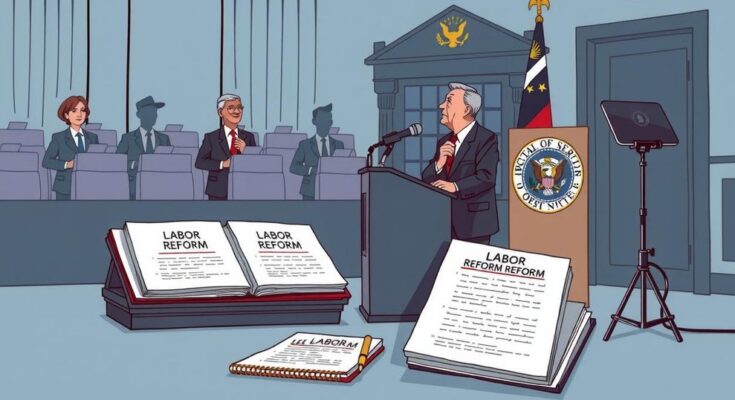Colombia’s government has unveiled a proposed referendum concerning labor reforms that aim to enhance employee rights and benefits but may hinder job creation. The questions include mandatory health insurance for freelancers and higher pay for Sunday workers. Business groups oppose these changes, citing possible adverse effects on employment. President Gustavo Petro is advocating for the referendum as a means to mobilize support amid congressional challenges.
In a significant move, the Colombian government has revealed plans for a referendum related to proposed labor reforms intended to enhance employee benefits. On April 22, 2025, the Interior Ministry disclosed 12 questions it seeks to present to voters regarding changes to labor laws that could also complicate job creation in the country, which stands as the fourth largest economy in Latin America.
Though the precise date for this referendum remains undecided and the measure still awaits Senate approval, the questions hint at a wide-ranging impact. Among them is a proposal to mandate food delivery platforms to provide health insurance to their freelancers and to require companies to pay double for Sunday work. Additionally, one question raises the possibility of adjusting “daytime work” hours to fall strictly between 6 a.m. and 6 p.m.
Business organizations voiced strong objections to the reforms, arguing that they may hinder small and medium enterprises from offering formal contracts and might inadvertently encourage informal employment practices. “The government’s reforms do not recognize the reality of 16 million informal laborers and unemployed people in Colombia,” Jaime Alberto Cabal, president of the National Association of Merchants, pointedly declared in a recent statement.
Other referendum queries focus on whether a dedicated fund for rural worker pensions should be established and whether companies must hire individuals with disabilities at a stipulated ratio. President Gustavo Petro, in a recent address, urged citizens to push Congress towards approving the referendum by setting a march to the legislative body for May 1.
During this address, President Petro asserted the importance of citizen decisions in shaping the future, criticizing Congress for allegedly sidelining public interests. This referendum, being a novel approach for any Colombian administration faced with legislative stagnation, illustrates Petro’s strategy to maneuver around congressional blockades involving labor laws and health care reforms crucial to his economic vision.
However, analysts have expressed doubts regarding the feasibility of achieving significant voter turnout, as at least a third of eligible voters must participate for the referendum’s results to be valid, equating to roughly 13 million votes. Political expert Yan Basset remarked on the challenges ahead, noting that while supportive political entities like labor unions may aim to engage voters, their mobilization efforts remain limited.
In summary, the Colombian government’s announcement about a potential referendum on labor reforms marks a pivotal moment in its legislative approach. The proposed queries, focusing on employee benefits and workplace equity, reflect significant societal issues but face resistance from the business sector. With President Petro striving to circumvent legislative inertia, the referendum presents both an opportunity and a considerable challenge amid Colombia’s political landscape. The future implications of this move will unfold as voter engagement becomes a critical factor for its success.
Original Source: apnews.com




